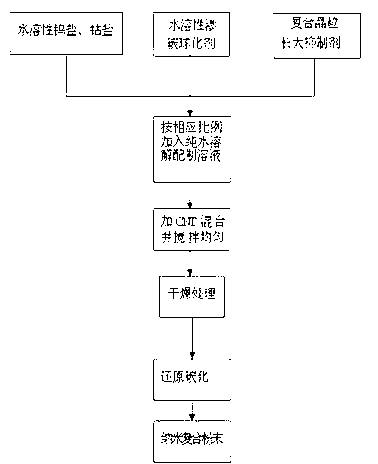Method for manufacturing nanometer tungsten/cobalt carbide composite powder
A nano-tungsten carbide and composite powder technology, applied in nanotechnology and other directions, can solve the problems of difficult control of carbon content of composite powder, easy aggregation and growth of particles, etc., so as to improve the surface tension of droplets, increase solution viscosity, and reduce processing and production costs. Effect
- Summary
- Abstract
- Description
- Claims
- Application Information
AI Technical Summary
Problems solved by technology
Method used
Image
Examples
example 1
[0040] Step 1: Mix 55kg of ammonium metatungstate (AMT), 40kg of Co(NO3) 2 , 3kg of polyethylene glycol (PEG) and 2kg of water-soluble vanadium salt are dissolved in 300kg of water to prepare a mixed aqueous solution;
[0041] Step 2: Add 1 kg of carbon nanotubes (CNTs) to the mixed aqueous solution obtained in Step 1, and stir at a rate of 10 rpm for 30 minutes to make it evenly mixed;
[0042] Step 3: The mixed aqueous solution obtained in step 2 is subjected to rapid low-temperature spray drying, the inlet temperature of the low-temperature drying is 150°C, and the outlet temperature is only 70°C, so that ultrafine tungsten-cobalt composite salt precursor powder can be obtained;
[0043] Step 4: The precursor powder obtained in step 3 is subjected to reduction synthesis and carbon adjustment at a temperature of 900° C. to prepare a tungsten carbide / cobalt composite powder material with a nanostructure.
[0044] The average grain size of the tungsten carbide / cobalt composit...
example 2
[0046] Step 1: Dissolve 92kg of ammonium paratungstate (APT), 3kg of cobalt oxalate, 3kg of polyvinyl alcohol (PVA) and 2kg of water-soluble vanadium salt in 400kg of water to prepare a mixed aqueous solution;
[0047] Step 2: Add 3 kg of carbon nanotubes (CNTs) to the mixed aqueous solution obtained in Step 1, and stir at a speed of 20 rpm for 40 minutes to make it evenly mixed;
[0048] Step 3: The mixed aqueous solution obtained in step 2 is subjected to rapid low-temperature spray drying, the inlet temperature of the low-temperature drying is 200°C, and the outlet temperature is only 90°C, so that ultrafine tungsten-cobalt composite salt precursor powder can be obtained;
[0049] Step 4: The precursor powder obtained in step 3 is subjected to reduction synthesis and carbon adjustment at a temperature of 900° C. to prepare a tungsten carbide / cobalt composite powder material with a nanostructure.
[0050] The average grain size of the tungsten carbide / cobalt composite powder...
example 3
[0052] Step 1: Mix 62kg of ammonium paratungstate (APT), 30kg of CoCl 2 1. Dissolve 6kg of starch and 2kg of water-soluble chromium salt in 500kg of water to prepare a mixed aqueous solution;
[0053] Step 2: Add 8 kg of carbon nanotubes (CNTs) to the mixed aqueous solution obtained in Step 1, and stir at a speed of 30 rpm for 60 minutes so that it can be mixed evenly;
[0054] Step 3: The mixed aqueous solution obtained in step 2 is subjected to rapid low-temperature spray drying, the inlet temperature of the low-temperature drying is 180°C, and the outlet temperature is only 80°C, so that ultrafine tungsten-cobalt composite salt precursor powder can be obtained;
[0055] Step 4: The precursor powder obtained in step 3 is subjected to reduction synthesis and carbon adjustment at a temperature of 1000° C. to prepare a tungsten carbide / cobalt composite powder material with a nanostructure.
[0056] Through Example 3, the average grain size of the tungsten carbide / cobalt compos...
PUM
| Property | Measurement | Unit |
|---|---|---|
| Average grain size | aaaaa | aaaaa |
| Average grain size | aaaaa | aaaaa |
| Average grain size | aaaaa | aaaaa |
Abstract
Description
Claims
Application Information
 Login to View More
Login to View More - R&D
- Intellectual Property
- Life Sciences
- Materials
- Tech Scout
- Unparalleled Data Quality
- Higher Quality Content
- 60% Fewer Hallucinations
Browse by: Latest US Patents, China's latest patents, Technical Efficacy Thesaurus, Application Domain, Technology Topic, Popular Technical Reports.
© 2025 PatSnap. All rights reserved.Legal|Privacy policy|Modern Slavery Act Transparency Statement|Sitemap|About US| Contact US: help@patsnap.com

